Can vitamin D supplements help protect against COVID-19
New Scientist reporting on Aug 3 Lancet publication
If newspaper headlines are to be believed, there’s a simple way to protect ourselves from the coronavirus: take a daily vitamin D tablet. Some say the benefits are so great that people should take mega-doses. But the scientific evidence doesn’t back up the claims. What should we believe?
Vitamin D is a fat-soluble compound made in the skin through the action of sunlight, and is also found in foods such as oily fish. It is chiefly known for building strong bones, but also plays a role in the immune system, including helping to kill virus-infected cells.
Some studies had previously suggested that taking vitamin D tablets wards off respiratory infections like coughs and colds, but in June the UK’s Scientific Advisory Committee on Nutrition (SACN) concluded that the evidence is not strong enough to support such an effect. However, it does advise taking a daily supplement for bone health, as do many other health bodies.
What about covid-19? Several respected researchers have said that vitamin D has potential to protect people from getting being infected with covid-19 in the first place or if they are infected, help to reduce their illness, and some supporting evidence has started to accrue.
However most is in the form of observational studies, which can be misleading because they don’t prove low vitamin D causes infections, just that it correlates with them. For instance, one study to make headlines last week found that people admitted to hospital with covid-19 had half the risk of death if they had adequate vitamin D levels, was of this type.
A third factor could be causing both low vitamin D and susceptibility to the virus, for instance obesity, as the vitamin is stored in fat tissue.
Read more: The truth about supplements: do they work and should you take them?
The best way to assess the benefits of vitamin D supplements would be trials giving people with covid-19 the vitamin to see if can help treat their symptoms. One recent such study from Spain found that people in hospital with covid-19 who received high doses of vitamin D were much less likely to need intensive care than those who did not receive it.
However, the study was quite small, involving just 76 people, and there happened to be more cases of high blood pressure in the group that got no vitamin D, which would have made their prognosis worse. But even when the results are corrected for that difference, there was still a large effect, says José Manuel Quesada Gómez at the Hospital Universitario Reina Sofía in Córdoba, Spain, who was involved in the study.
The trial also only tells us that Vitamin D seems to work as a treatment for hospital patients, not that it works as a prevention method for the public. It is promising, but a larger study is needed, says Susan Lanham-New, who is a member of SACN.
Regardless of its impact on covid-19, there is one thing that all experts seem to agree on: most people in temperate climates like in the UK become vitamin D deficient over winter, when the sun is too weak to prompt production of the vitamin in the skin. And so, if only to support strong bones, most people should take a standard vitamin D supplement every day, from October onwards in the northern hemisphere.
If people are concerned about coronavirus and want to take double the daily recommended dose, it is unlikely to do harm, says Lanham-New. “The most important thing is to avoid vitamin D deficiency.”
Journal reference: The Lancet Diabetes & Endocrinology, DOI: 10.1016/S2213-8587(20)30268-0
See also in VitaminDWiki
COVID-19 treated by Vitamin D - studies, reports, videos
{include}
and has the following recent updates
{include}
Many clinical trials are testing Vitamin D to fight COVID-19

50 most-recently changed items in Virus Category in VitaminDWiki
{LISTPAGES}
